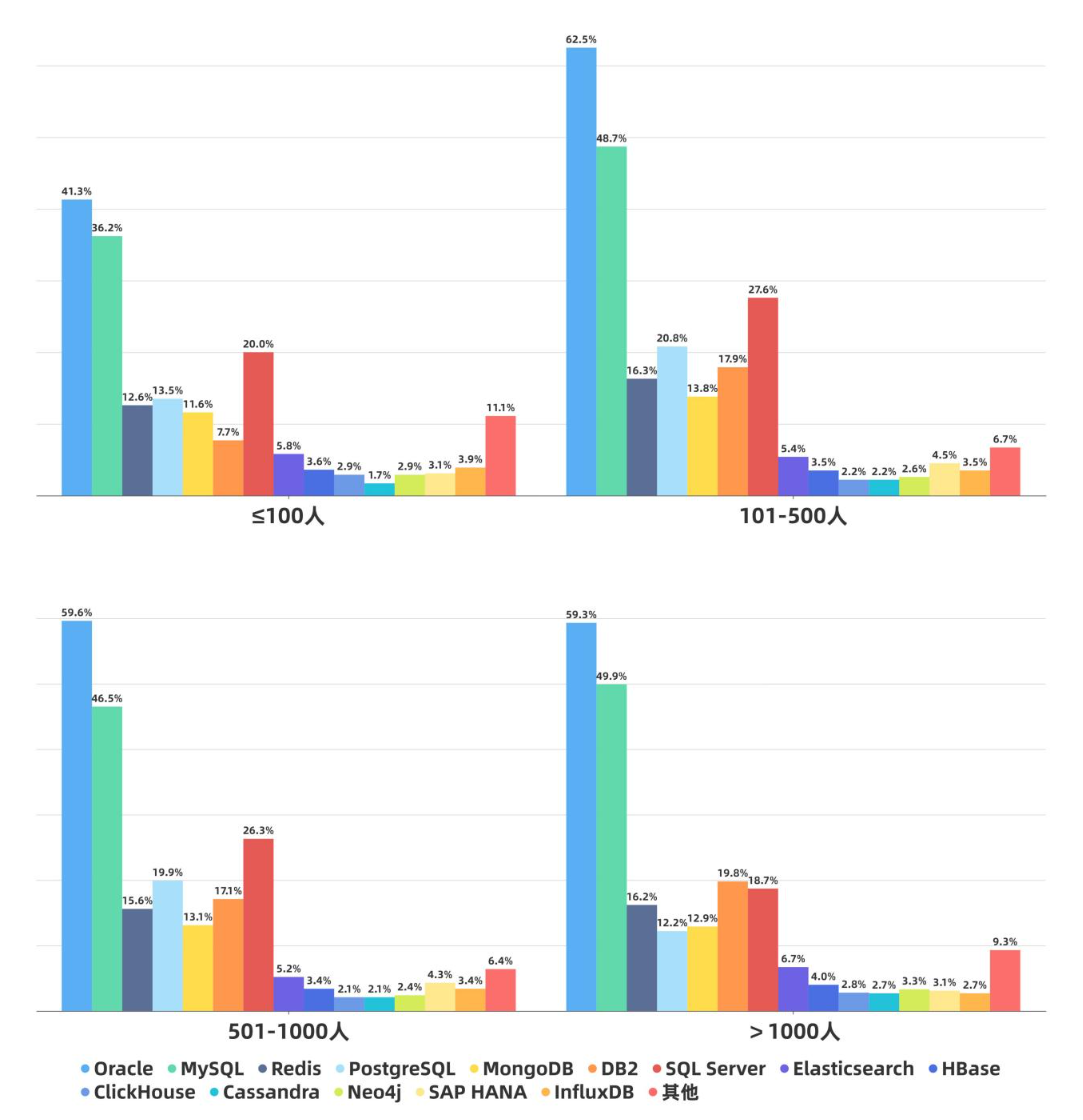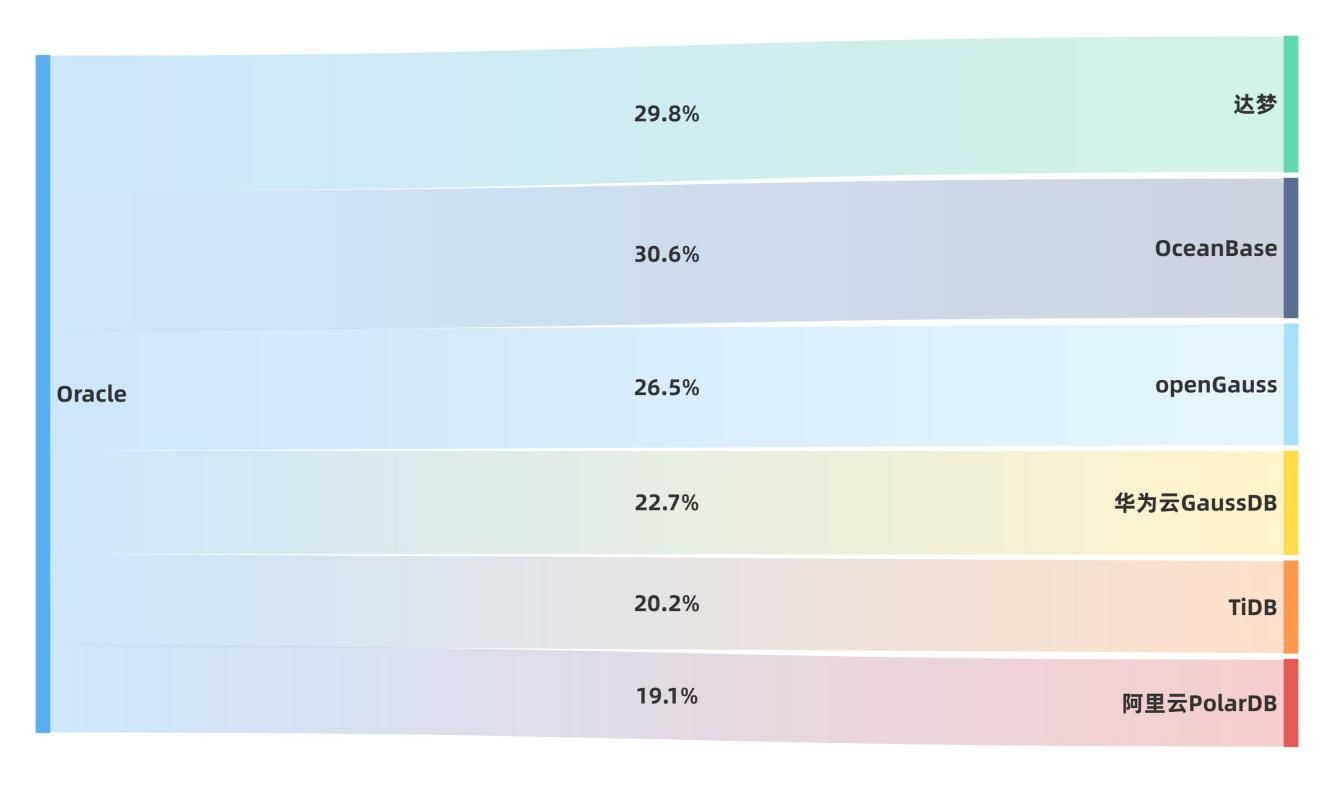In order to understand the current situation of the database industry and practitioners, database selection, and the development trend of Chinese databases, Motianlun began to collect questionnaires in 2022. It took 24 days to collect a total of 3,476 valid questionnaires, and on February 10 Organized and released the "2022 Motianlun Database Survey Report" . Previously, we successively introduced data on domestic enterprises’ usage rate of domestic databases, practitioners’ favorite domestic databases, practitioners’ salaries, etc. (you can refer to historical articles ) . Usage.
The data shows that 96.1% of enterprises are using foreign database products , which has something to do with the early development of foreign databases, the complete range of service products and the large market they have occupied in the early stage. However, with the continuous growth of China's database industry and the continuous iteration of technology, more and more companies have indicated that they have or will gradually replace them with localization. Next, let us learn more about the relevant data in this survey.
The use of foreign databases by domestic enterprises
MySQL is the most used foreign database product in China, and Oracle ranks second
According to the survey data, 78.7% of the respondents' companies are using MySQL, and its usage rate in China ranks first compared to other foreign databases. The history of MySQL can be traced back to 1979, and it is loved by users at home and abroad for its open source, free, and stable features. It is followed by Oracle and Redis, whose utilization rates accounted for 73% and 47.7% respectively.

It can be found that MySQL and Oracle are the two most popular foreign database products in China , and their usage rates have opened up a big gap with other foreign database products. Among them, the usage rates of Redis, SQL Server, PostgreSQL, MongoDB, and Elasticsearch have exceeded 20%.
Nearly seven of the enterprises that do not use foreign databases are small and medium-sized enterprises
In this survey, only 3.9% of enterprises currently do not use foreign databases. By analyzing the size of their enterprises, it can be found that enterprises that do not use foreign databases are mostly small and medium-sized enterprises with less than 500 employees, and enterprises with ≤100 employees and 101- Enterprises with 500 employees accounted for 37.0% and 30.4% respectively.

Domestic enterprises' intention to replace foreign databases
More than 80% of enterprises have plans to replace foreign databases, and most of them want to replace Oracle
According to the survey data, 86.2% of domestic enterprises intend to replace foreign databases . Among them, 58.6% of enterprises want to replace Oracle database. Before the Russian-Ukraine war broke out, Oracle suspended all business and technical support in Russia, which also brought some Chinese Oracle users to a certain degree of vigilance. Second, 47.3% of enterprises want to replace the MySQL database, followed by SQL Server and PostgreSQL databases.

SMEs have the strongest willingness to replace Oracle
After analyzing the current enterprise size of the respondents who intend to replace foreign databases, it can be found that among SMEs with 101-500 employees, the proportion of respondents who intend to replace Oracle accounts for the largest proportion, reaching 62.5%. In enterprises with ≤100 employees, only 41.3% of the respondents believe that their enterprises want to replace the Oracle database. The main reasons for the low intention of micro-enterprises to replace Oracle may be: first, micro-enterprises have fewer sets of database deployments than other scale enterprises; second, micro-enterprises have a low ability to resist risks and dare not try and make mistakes.

Among enterprises intending to replace Oracle, they most want to migrate to OceanBase, Dameng or openGauss
According to the survey data, 58.6% of the respondents who are using the Oracle database indicated that their enterprises have the intention to replace the foreign database. Among them, 30.6% of the respondents said they want to replace OceanBase , followed by Dameng and openGauss, accounting for 29.8 and 26.5% respectively.

Well, the foreign databases of domestic companies introduced in this article belong to Section 3.3 of the report, and will not be expanded here due to space limitations. If you want to know more, you can download the report for reference.
点击可在线查阅/下载文档: https://www.modb.pro/doc/97913
本报告全面深入总结了数据库行业以及从业人员的发展现状,除了本文所展示的国内企业对国外数据库使用的现状与替换意向外,也包含从业人员薪资/行业分布、国产数据库使用情况、数据库上云现状、数据库选型等多维度内容,望对各相关政府部门、从业人员以及数据库行业提供参考资料。欢迎大家下载、参考!
欲了解更多可浏览墨天轮数据社区,围绕数据人的学习成长提供一站式的全面服务,打造集新闻资讯、在线问答、活动直播、在线课程、文档阅览、资源下载、知识分享及在线运维为一体的统一平台,持续促进数据领域的知识传播和技术创新。添加社区墨天轮小助手(VX:modb666)可以获取更多技术干货。